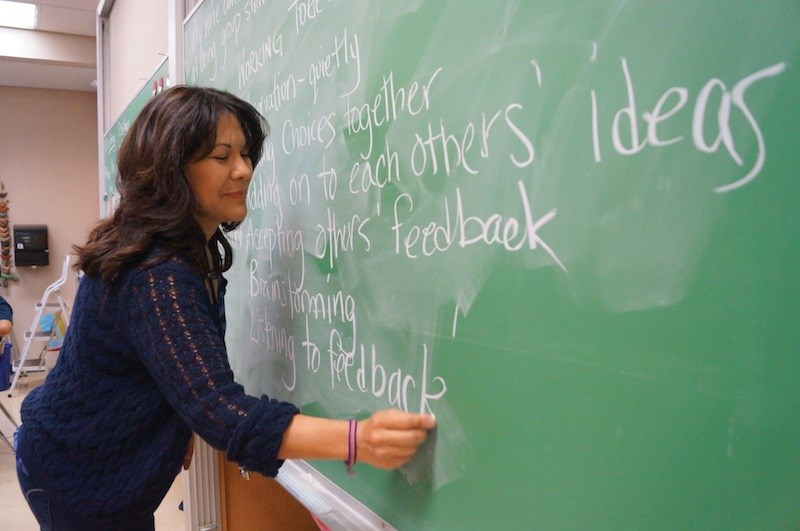Start thinking about packing lunches for Monday, school is back.
But the question for teachers is, can things ever go back to the way things were?
On Thursday evening, members of the BC Teachers’ Federation overwhelmingly supported an agreement made between union leaders and the BC Public School Employers’ Association.
Of the 31,741 teachers who voted, 86 per cent said ‘yes’ to the six year agreement that will, in fact, expire at the end of the 2019 school year.
The Ministry of Education has told the Richmond School District that it will not be making up for time lost as a result of the teachers' strike and government lockout, according to Richmond's school superintendent Monica Pamer.
Students lost three weeks of school commencing in September.
Pamer informed the public via an online letter Thursday afternoon.
Pamer said students will partake in a shortened school day on Monday, while Tuesday will mark the full return of school.
Parents are being advised to check the school websites for opening times.
Pamer said professional development days scheduled for September will be rescheduled to a later date. Also, schools on a two-semester calendar will have their timetables adjusted between the first and second semesters.
Jim Iker, president of the BCTF, said the deal wasn’t everything the teachers were looking for but some key elements were achieved on its part.
“We all know this deal isn’t perfect, but it provides some gains for teachers, protects our CharterRights, and increases support for students,” said Iker.
Richmond Teachers' Association president Al Klassen said "the official RTA stance is, it's a deal. …It's a deal, not a great deal."
Klassen is concerned many of the same problems may rear their ugly heads in four and a half years time.
"It keeps us as one of the lowest paid teaching professions across the country. It perpetuates the concerns we've been on about since the late 1990s," said Klassen.
He said many teachers felt compelled to agree to the terms simply because they wanted to get back to work and/or could not afford to continue the strike.
"It's not going along well with a number of teachers, but they're in a position, they want and need to go back to work. All those things are playing around in their minds," said Klassen.
He said, since his time as RTA president, never have relations between the school district and teachers been at such a low — a result of how the labour dispute played out in Richmond.
"Relations are strained," said Klassen, giving no detailed suggestions as to why.
One possible source of contention could be that the district administrators carried out activities for international students during the labour dispute.Teachers will receive a two per cent pay raise this September. For the term of the contract teachers will get 7.5 per cent, retroactive of July 1, 2013.
Iker said the teachers will receive better health benefits as well. They also get 10 extra minutes of preparation time per week.
Teachers-on-call will also get a slight pay raise.
“Next week, teachers will be back in classrooms and we will be working to ensure the new gains in this agreement begin to flow as soon as possible. That means more classroom and specialist teachers in schools to help students, our teachers teaching on call getting fair pay for a day’s work, and a salary boost for all members,” Iker added.
In an online statement, Minister of Education Peter Fassbender thanked teachers for accepting the deal.
The government and the union also reached a $105 million settlement for any potential grievances the union had with the government for stripping away class size and composition language in the 2002 contract.
Over the next five years the BCTF will be handed an “education fund” of $80 million per year, on average, to hire teachers to help with classroom composition and size deficiencies.
Klassen said that issue is now behind both parties, but another big fight could be around the corner.
The provincial government has appealed a BC Supreme Court ruling that deemed it illegal for the government to have taken away teachers' rights to bargain class size and composition, back in 2002. The case is to be heard next month.
If the teachers win again (and the province doesn’t appeal to the Supreme Court of Canada) the two sides will need to negotiate class sizes and composition (ratio of special needs students) as the agreement calls for a "re-opener" clause. Failing negotiations, the agreement stipulates the issue would go to arbitration.
"The hope for teachers is the (court) case will show the language taken away was in violation to Charter provisions and therefore needs to be restore. Government most likely will come back and say there are financial restraints," said Klassen.
Klassen said a strong ruling in favour of the teachers would likely mean the education fund would be revised as teachers would likely demand smaller classrooms and class composition as it sees fit.
Pertaining to class composition, Minister Fassbender has, several times, called into question the nature and definition of what a special needs student is. As such, coming to an agreement on these definitions could play a key part in the post-court ruling negotiations: if the definition of special needs is broad, there would need to be more teachers and classroom assistants, whereas if the definition is narrow, the government would achieve its ultimate goal of saving money.
BCTF-Government settlement, 2014



